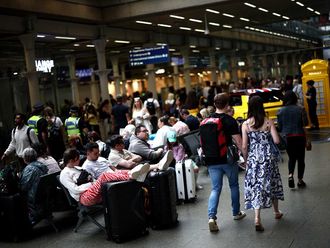
London: Bringing cake into the office to share with colleagues is seen by many as an innocent way to celebrate a birthday, share good news or even showcase one’s baking skills. But the top official at Britain’s food regulator, speaking in her personal capacity, has suggested that it could be as harmful as secondhand smoke.
“If nobody brought in cakes into the office, I would not eat cakes in the day, but because people do bring cakes in, I eat them,” professor Susan Jebb, chairwoman of the Food Standards Agency, told Britain’s Times newspaper. “We all like to think we’re rational, intelligent, educated people who make informed choices the whole time, and we undervalue the impact of the environment.”
In a statement provided to The Washington Post by the Food Standards Agency, Jebb said: “As The Times article points out I made the comments in a personal capacity and any representation of them as the current position or policy of the FSA is misleading and inaccurate.”
Jebb, who teaches diet and population health at Oxford University, noted that people have freedom of choice, but stressed that offering sweet treats at work could influence people to make unhealthy decisions. She also said working in a “supportive” environment is crucial to one’s health.
“With smoking, after a very long time, we have got to a place where we understand that individuals have to make some effort, but that we can make their efforts more successful by having a supportive environment,” she said. “But we still don’t feel like that about food.”
Britain’s government has long grappled with how best to tackle the issue of obesity. From 2020 to 2021, the National Health Service spent an estimated 6.5 billion pounds on overweight and obesity-related ill health, according to a study led by consultancy Frontier Economics.
About 26 percent of adults in England are obese, and another 38 percent are classified as overweight, according to the Health Survey for England 2021. The survey found that men are more likely than women to be overweight or obese. Obesity levels increased from 15 percent in 1993 to 28 percent in 2019, a government report published last week said.
In 2020, British Prime Minister Boris Johnson opened up about his own struggles with weight gain during his time in office, saying: “I was too fat.” Johnson said it was his battle with Covid-19 - for which he was hospitalised and given supplemental oxygen - that forced him to reassess his health and physique.
The vast majority of global Covid-19 deaths occurred in nations with high levels of obesity, according to a 2021 report by the World Obesity Federation. The investigation found that 88 percent of deaths due to Covid-19 in the first year of the pandemic were in countries where more than half of the population is classified as overweight.
That same year, the World Health Organisation said that obesity worldwide had almost tripled since 1975, putting millions at risk of cardiovascular diseases, musculoskeletal disorders and even cancers like liver, prostate and colon.
The organisation defines overweight people as those who have a BMI greater than or equal to 25 and obese people as those with a BMI of 30 or higher.
Jebb told the Times that she does not believe people can rely solely on the “extraordinary efforts” of personal willpower to avoid eating unhealthy foods, and that a societal shift - including doctors being more upfront about the issue - is still needed.










_resources1_16a30b3523c_small.jpg)

